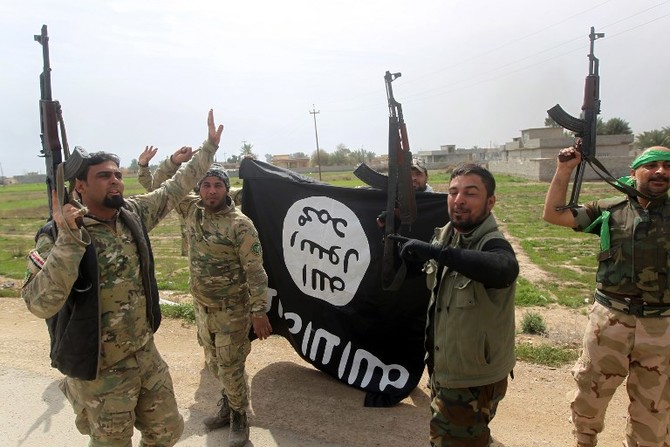BAGHDAD: Iraq on Monday celebrated the anniversary of its costly victory over Daesh, which has lost virtually all the territory it once held but still carries out sporadic attacks to hang on to its last enclave in Syria near the Iraqi border.
The government declared victory last December after a grueling three-year war in which tens of thousands of people were killed and hundreds of thousands displaced. Entire towns and neighborhoods were reduced to rubble in the fighting.
The government declared Monday a national holiday, and a moment of silence is planned for later in the day. Checkpoints in the capital were decorated with Iraqi flags and balloons, as security forces patrolled the streets playing patriotic music.
As part of the celebrations, authorities plan to reopen parts of Baghdad’s fortified Green Zone — home to key government offices and embassies — to the public. The move is billed as an act of transparency following protests against corruption and poor public services.
The celebrations come as political infighting has hindered the formation of the government and setting next year’s budget amid an acute economic situation.
Addressing a group of Iraqi military officers, Prime Minister Adel Abdul-Mahdi said it was a “proud day for all of us when our brave country defeated the enemies of life, dignity, freedom and peace.”
He commended the security forces as well as Iraq’s top Shiite cleric, Grand Ayatollah Ali Sistani, who issued a fatwa, or religious edict, mobilizing volunteers after the armed forces collapsed in the face of the Daesh onslaught in 2014. Tens of thousands of volunteers joined an array of state-sanctioned militias, many of them backed by Iran.
“That fatwa will be a bright spot in the history of this country and the people, from whom the decisive response started, laying the foundations of the victory,” Abdul-Mahdi said.
He called on Iraqis to renounce their differences and to come together for a better future. “The time has come to leave behind all the past mistakes and conspiracies to open the doors of hope for our children for a better future,” he said, vowing to rebuilt the demolished areas and help displaced people return to their homes.
“This war has restored Iraq’s dignity,” said Baghdad resident Qassim Al-Fatlawi. “All Iraqis took part in this fight, those who couldn’t take up arms fought with words and donations,” added Al-Fatlawi, 29, who organized fundraising initiatives for the paramilitaries.
Popular songs praising the paramilitaries, also known as the Popular Mobilization Forces, blared out from his small accessories shop cosmetic in a narrow alley in Baghdad’s Shiite-dominated Karrada area, which today is adorned with rows of Iraqi flags. He said he planned to put out a large tray of free sweets for customers later in the day.
“That victory and the relative stability in security is a golden opportunity for the government to rebuild the country and to meet the needs of its people,” said Sameer Al-Obaidi, who led an initiative in the capital’s Sunni-dominated northern Azamiyah neighborhood to distribute flowers to security forces at checkpoints. “It is important to treat all Iraqis equally so that they feel that their sacrifices are appreciated,” Al-Obaidi added.
Daesh, which traces its roots back to the insurgency that followed the 2003 US-led invasion, swept into Iraq from neighboring Syria in the summer of 2014. It carved out a self-styled caliphate across a third of both countries, imposing a brutal form of Islamic rule and massacring its opponents. The group abducted thousands of women and girls from the Yazidi religious minority and forced them into sexual slavery.
Iraqi forces aided by a US-led coalition eventually drove the group from all the territory it once held in Iraq, including in the climactic battle for Mosul, the country’s second-largest city. These days, Daesh is still fighting to hold onto a small pocket of territory in Syria, near the Iraqi border.
Iraq is still grappling with the legacy of the extremist group’s brutal rule.
More than 1.8 million Iraqis remain displaced across the country, and a staggering 8 million require some form of humanitarian aid, according to the Norwegian Refugee Council. Those with suspected links to Daesh have been rejected by their communities, while thousands of children fathered by Daesh militants — including those born to enslaved Yazidi women — are still unrecognized by the state.
Nearly two-thirds of displaced people say they are unwilling or unable to return home in the next year, with more than half saying their homes were damaged or destroyed, said the aid group.
“If this is what ‘victory’ looks like, then there is little to celebrate for millions of Iraqis still haunted by the crimes of the Daesh and the long war to eliminate it,” said Norwegian Refugee Council Secretary General Jan Egeland. “They have largely been forgotten by their own government and the international community.”






























